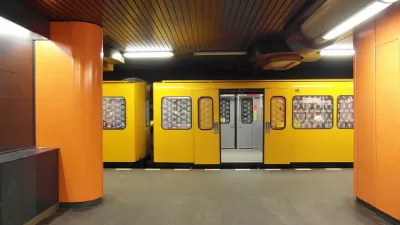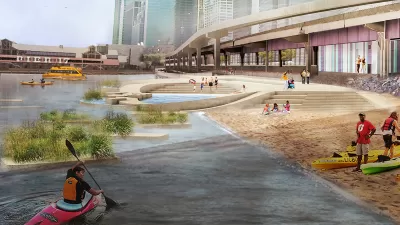Charles Montgomery discusses the findings of a fascinating study on the responses of residents and visitors to different environments in New York, Berlin and Mumbai. The results hint at the impact of experience and memory on how we perceive a place.
"My friend Colin Ellard has just issued final results [PDF] for Testing, Testing, his study of the psychophysiological effects of public space in New York City, Berlin and Mumbai," writes Montgomery. "The program involved taking small groups of volunteers on neighbourhood tours, and collecting data at various distinct stops on the way. Colin hacked Blackberries in order to accept participants’ self-reports on affect and arousal. He also attached skin conductance monitors to some participants, to gather objective data on arousal."
While participants uniformly responded positively to green environments and permeable facades, their reactions to other environments differed from each other.
"This is a powerful reminder that when we experience a place we are not merely responding objectively to geometry and design," observes Montgomery. "We are responding to the idea of the place, our previous experience and memory of it, and the messages and stories that it might trigger."
"These results, then, carry a crucial message for city planners and policy-makers: if you don’t include local people in planning and decision-making, then your plans will simply not be based on an accurate understanding of the place."
FULL STORY: Emotions in place: why do visitors to New York have a different physical reaction to streets than locals?

Maui's Vacation Rental Debate Turns Ugly
Verbal attacks, misinformation campaigns and fistfights plague a high-stakes debate to convert thousands of vacation rentals into long-term housing.

Planetizen Federal Action Tracker
A weekly monitor of how Trump’s orders and actions are impacting planners and planning in America.

In Urban Planning, AI Prompting Could be the New Design Thinking
Creativity has long been key to great urban design. What if we see AI as our new creative partner?

King County Supportive Housing Program Offers Hope for Unhoused Residents
The county is taking a ‘Housing First’ approach that prioritizes getting people into housing, then offering wraparound supportive services.

Researchers Use AI to Get Clearer Picture of US Housing
Analysts are using artificial intelligence to supercharge their research by allowing them to comb through data faster. Though these AI tools can be error prone, they save time and housing researchers are optimistic about the future.

Making Shared Micromobility More Inclusive
Cities and shared mobility system operators can do more to include people with disabilities in planning and operations, per a new report.
Urban Design for Planners 1: Software Tools
This six-course series explores essential urban design concepts using open source software and equips planners with the tools they need to participate fully in the urban design process.
Planning for Universal Design
Learn the tools for implementing Universal Design in planning regulations.
planning NEXT
Appalachian Highlands Housing Partners
Mpact (founded as Rail~Volution)
City of Camden Redevelopment Agency
City of Astoria
City of Portland
City of Laramie





























